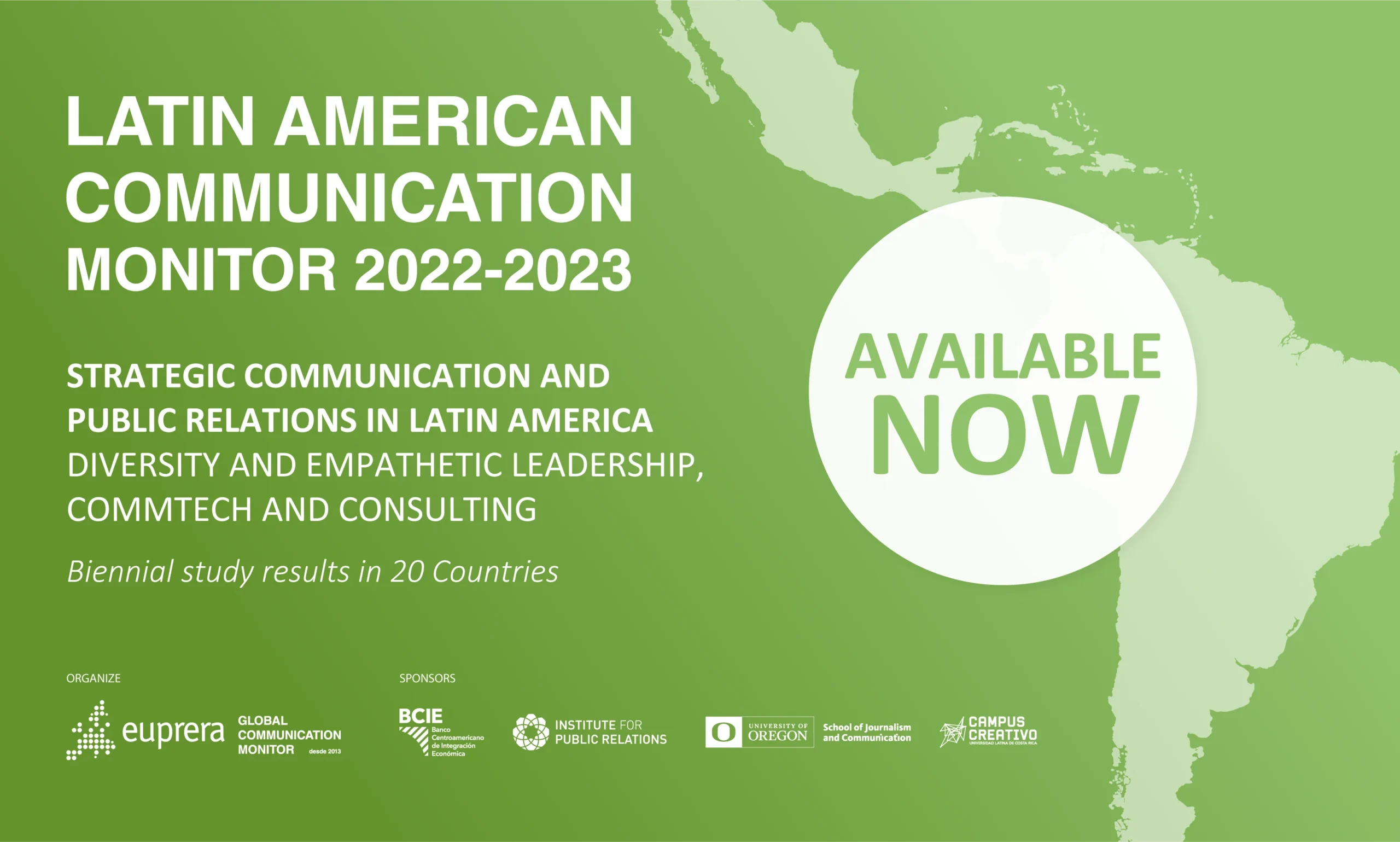The CommTech phenomenon, consultancy, diversity, and empathy in leadership: new factors to consider in communication management in Latin America
Latin American Communication Monitor (LCM): 10 years of scientific research for the development of the profession in the region and its positioning in the world.

The Latin American Communication Monitor (LCM) is the most prestigious scientific study in Latin America on strategic communication and public relations. In the 2022-2023 edition, titled ‘Strategic Communication and Public Relations in Latin America: Diversity and Empathetic Leadership, CommTech, and Consultancy’, 1,134 professionals from 20 countries have contributed, providing a comprehensive view of the profession in the region. The results of the LCM have identified 10 key trends that will be the focus of discussions in the field of strategic communication and public relations in the coming year 2024.
These trends provide a valuable perspective on the current and future state of the sector.
- Actions on diversity, equity, and inclusion (DEI) reinforce stakeholders’ trust.
- Empathetic leadership increases engagement, improves mental health, and reduces turnover.
- Digitization (CommTech) will have a transformative impact on the profession and work methods.
- The benefits of using CommTech in different ways far outweigh its potential drawbacks and risks.
- External communication consultancy represents half of the activity and becomes more relevant, diverse, and complex.
- Strengthening the advisory role of communication is a key issue to the profession.
- The need to connect organizational strategies with communication deepens.
- Sustainability remains outside the top-five priorities in communication management.
- Women earn less: the gender pay gap continues to be a challenge in the profession.
- The pursuit of excellence in communication, a growing vector of competitiveness for the sector.
Sponsored by




KEY FINDINGS OF THE LCM 2022-2023
Diversity, Equity, and Inclusion (DEI) are significant challenges for the profession
While more than 50% of professionals engage in global discussions on Diversity, Equity, and Inclusion (DEI) and consider it a highly debated topic in the profession at the national level, only 20% position it as one of the key strategic issues for the next three years. DEI discussions are more intense for executive positions (60%) and more prominent in countries like Brazil, Puerto Rico, and Chile, while they are less relevant in Venezuela, Peru, and the Dominican Republic. Publicly traded companies and consulting/agencies show a greater interest in DEI compared to the public sector. Over 80% of professionals emphasize that actions related to DEI and consistency between words and deeds on the topic are crucial to maintaining the trust of internal and external stakeholders. Another relevant finding is that only 36% of study participants assert that communication departments are primarily responsible for DEI initiatives, and 62% stated that they collaborate with other departments (such as human resources) on this issue. Forty-eight percent consider it the department’s utmost responsibility to assess and refine plans and content on DEI, followed by 47% for developing plans for communicating the topic. Significant differences in gender, age, socioeconomic status, and political opinions impact perceptions of DEI in different types of organizations.
Empathetic leadership increases engagement, improves mental health, and reduces employee turnover
Eighty-one percent of surveyed individuals have experienced empathy from their leaders, with 77% noting an increase in the past year. Key expressions of empathy include: attention and listening (80%), concern for the well-being of others and demonstrating sensitivity and understanding (79%), and identifying the strengths and limitations of team members (79%). Consultancies and agencies have leaders with higher empathy levels. Despite this, 30% plan to change jobs. Regarding mental health, 72% doubt the importance of their work, but 56% feel used, although 86% believe they can solve problems. Those working in consultancies and agencies exhibit higher commitment, better mental health, and less job turnover. Male professionals show higher work commitment and engagement, while younger professionals are less satisfied and have higher intentions of changing jobs. In conclusion, empathetic leadership enhances engagement and mental health in communication management, which can have a positive impact on various social aspects.
CommTech: A less debated and applied trend that will change the profession
The study shows that only 30% of communication professionals in Latin America closely follow the debate on CommTech. However, between 65% and 70% believe in its transformative impact on the profession and work methods. While 80% of respondents highlight the benefits of CommTech, approximately one-third see disadvantages in communication with stakeholders and workflow processes. Only 11% of communication departments and agencies have fully adopted CommTech. Adoption challenges lie in organizational deficiencies, such as structural barriers (47%) and communication tasks/processes unprepared for digitization (46%). To progress, collaboration is needed from all parties, including professional associations, communication departments, agencies, and professionals. Creative ideas and motivating strategies are required to accelerate digitization in the field of communication.
External consulting is becoming increasingly relevant, diverse, and complex
Most communication professionals in Latin America perceive an increase in the need for external consulting in stakeholder communication (73%) and organizational communication structure and processes (70%). At the same time, 76% see the consulting industry becoming more diverse and complex, with 61% stating that ensuring the quality of external consulting is more challenging. Regarding challenges, weak governance, leadership, or internal processes (52%) stand out in the entry phase, and lack of competent people and knowledge (56%). Regarding the most important dimension to ensure the quality of consulting processes, 94% mention the level of developed competencies, followed by a positive spirit during the process (93%). The majority (87%) supports the idea of quality standards for communication consulting, with 89% endorsing standards for clients to value and secure consulting. However, there is less support (14%) among non-profit organizations. There is a relative consensus on the need to define quality standards in Latin America, with Uruguay and Panama showing less agreement.
The advisory function of communication and its alignment with organizational objectives are key strategic issues in management
«Strengthening the role of the communication function to support top-level decisions» leads with 42%, rising from the fourth position in the previous edition. «Connecting organization strategies with communication» moves to the second place (38%). Other topics in the top five include «dealing with the speed and volume of information flow» (34%), «using big data and/or algorithms for communication» (33%, with higher relevance in companies), and «exploring new ways of content creation and distribution» (29%). «Addressing sustainable development and social responsibility» lags, especially for government organizations, despite the climate emergency and the UN Sustainable Development Goals. Topics like the digitization of communication processes (21%), diversity, equity, and inclusion (15%), and remote work (13%) are considered less relevant. The low priority given to remote work may be due to its widespread establishment in the post-pandemic era. Currently, two-thirds of professionals work regularly remotely, driving the use of digital tools such as instant messaging (91%) and video conferencing (73%), although practices vary in Latin America.
The gender pay gap persists, reflecting lower earnings for women
Regarding the salaries of communication professionals in Latin America, it is observed that 73% earn less than 30 thousand dollars annually, while 18% receive up to 60 thousand dollars. Although, in comparison to Europe, where only 22% earn up to 30 thousand dollars, the analysis of the new edition reveals an increase in Communications Directors (Dircoms) earning between 30 and 60 thousand dollars annually (4% more than the previous year). Although managerial positions in the region earn more than in 2020-2021, salary ranges from 100 to 200 thousand have decreased between 0.2% and 0.7%. The analysis by type of organization shows high salary levels overall, with Puerto Rico (with a dollarized economy) having the best salary distribution. Regarding gender differences, women hold 65% of managerial positions earning less than 30 thousand dollars, while men in the same salary range represent 52%.
Only 2 out of every 10 strategic communication and public relations departments are excellent
Nearly 80% of communication departments do not reach excellence levels, meaning that only 23% optimally fulfill both executive and advisory functions while performing competitively successfully compared to other organizations. This finding is consistent with previous editions in Latin America and other regions. Excellent departments emphasize the communication of diversity, equity, and inclusion initiatives, proactively address their impact, and have greater responsibility in developing associated policies. Those leading these departments demonstrate higher commitment and empathetic leadership, reflected in the well-being of their teams, reducing the likelihood of resignations. In terms of digital transformation, excellent departments lead innovation and the early adoption of communication technology, facing fewer challenges in implementation. Additionally, flexible and remote work, along with the use of digital collaboration tools, are more ingrained in these departments.
Download the Full Report here
Download the Executive Summary here
Access the Press Room here


















